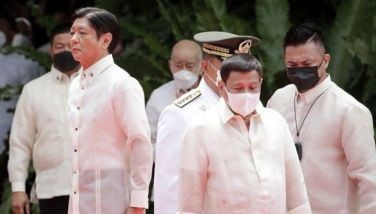DND: Proposed mandatory ROTC follows international laws
MANILA, Philippines — The Department of National Defense on Thursday backed the proposed measure to reinstate the mandatory Reserve Officers' Training Corps for senior high school students.
Norman Daanoy, chief of the Legal Affairs Service of the DND, said the proposal to revive the mandatory ROTC program follows international laws.
“ROTC program in grades 11 and 12 is not in conflict with international laws, UN (United Nations) Convention against the protection of children… It is not in conflict with the Optional Protocol,” Daanoy said during the Senate public hearing into the proposed mandatory ROTC.
Daanoy said that under the Optional Protocol to the United Nations Convention on the Rights of the Child, state parties agreed they would not recruit for their armed forces anyone below 18 years old.
“The Philippines acceded to that,” he said.
The DND official, however, said the Philippines agreed with the convention but with reservation. He said the country could recruit Filipinos below 18 years of age for training as students and cadets.
“We can recruit below 18 as cadets but it cannot be called to active service,” Daanoy said.
“There’s no conflict with that,” he added.
Daanoy said the Philippines submitted this reservation to the UN because the Philippine Military Academy’s admits students aged 17.
According to Daanoy, PMA applicants will train for years and by 18 years of age could already take the oath.
Daanoy also clarified that the proposed mandatory ROTC is not considered recruitment for the Armed Forces of the Philippines.
“Why? Because recruitment in ROTC is still voluntary,” he said.
Last May, Sen. Risa Hontiveros and childrens' welfare advocacy group Child Rights Network said the proposed bill to require military training in senior high school violates international laws.
READ: 'Mandatory military training for minors against UN protocol, Philippine laws'
Hontiveros stressed that the proposed bill would affect students aged 16 to 17 years old and requiring them to enroll in the ROTC would be a violation to the Optional Protocol to the UN Convention on the Rights of the Child.
Child Rights Network also said that under the Concluding Observations for the Philippine Government’s Compliance Report on the Optional Protocol on Children in Armed Conflict, military training for children “promotes militarism and is contrary to peace-building education of the State party and to the spirit of the Optional Protocol.”
Sen. Imee Marcos, who attended Thursday probe on the ROTC reinstatement, also cited these UN laws.
'Why senior high school?'
Despite these criticisms, the DND said that even the Department of Foreign Affairs, Department of Justice and the Office of the Solicitor General already studied the proposed mandatory ROTC program for senior high school students and determined that “is not in conflict with the international law.”
Daanoy added that the mandatory ROTC best suits senior high school students or grades 11 and 12.
“We have already resolved this issue and considered that grade 11 is the best for our youth to be trained in nation-building, nationalism, love for country, future and to defend of the country,” the defense official said, clarifying that he meant senior high school and not only grade 11 students.
He said that based on the DND assessment, only two or three of 10 Filipino elementary graduates proceed to college.
Daanoy added that President Rodrigo Duterte, who certified the reinstatement of the mandatory ROTC program as urgent, said that the seven or eight who won’t pursue college might have the tendency to go to the mountains and join rebel groups.
“We have to train them,” he said.
The lawmakers of the 17th Congress failed to pass the mandatory ROTC bill due to "lack of time."
- Latest
- Trending






























